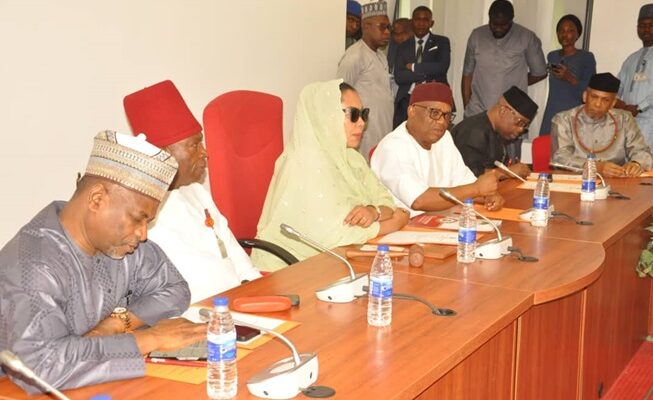Newly appointed Senate Chairman on Diaspora, Senator Natasha Akpoti-Uduaghan, has advocated for a functional governance to address the “Japa” syndrome — the mass emigration of Nigerians seeking better opportunities abroad.
Speaking at the inaugural meeting of the committee, Sen Akpoti-Uduaghan emphasised that reversing this trend requires creating an enabling environment that encourages Nigerians to stay and invest in their home country.
She highlighted the urgent need for structural economic reforms to retain Nigerian talent and harness the diaspora’s potential for national development.
“We cannot keep losing our best brains to other countries. However, the solution is not to force them to stay. People stay where opportunities are abundant, security is assured, and governance is functional. Nigeria must provide these conditions to stop the Japa syndrome,” she stated.
To address this, the senator proposed three key strategies to include Establishing a Diaspora Investment and Development Bank
She advocated for the creation of a Diaspora Bank, where Nigerians abroad can invest their remittances into structured projects in Nigeria.
This bank, she said would be managed by trusted professionals, would allow diaspora contributions to be channeled into sectors like healthcare, infrastructure, and technology.
“Diaspora remittances contribute over $21 billion annually to Nigeria’s economy. We must create a system where this wealth can be strategically invested in sectors that will drive economic growth, instead of being consumed on daily expenses alone,” she explained.
The second strategy she is to expand Economic Opportunities and Industry Development
She pointed out that countries like India and Ethiopia have successfully harnessed their diaspora by establishing industries where returning citizens can work and contribute their expertise.
Akpoti-Uduaghan called for the development of high-tech zones, textile hubs, and manufacturing sectors, ensuring that skilled professionals can return home to viable job opportunities.
“Nigeria must take lessons from countries like India, which dominates the global ICT sector, and Ethiopia, which has established over 80 thriving textile industries with the help of its diaspora. We must replicate these models,” she said.
The third strategy she proposed is the creation of a Comprehensive Nigerian Diaspora Database
The senator emphasised the importance of gathering accurate data on Nigerians abroad to properly engage, integrate, and support their participation in national development.
She proposed working with embassies to compile data on Nigerians in America, Canada, Europe, Asia, and Africa, identifying their skills and potential contributions.
“How many Nigerians are in America? Canada? Europe? We need to know. Data drives decision-making. We must also track how diaspora funds are used to ensure transparency and accountability,” she stated.
Akpoti-Uduaghan also stressed the need to engage international organisations such as the Bill & Melinda Gates Foundation and other global NGOs that provide funding, training, and technical expertise for development projects.
She further announced plans to organise a Nigeria Diaspora Business Summit, where Nigerian professionals abroad can showcase their innovations, businesses, and investment opportunities in the country.
“Our goal is to make Nigeria a hub where our citizens, whether at home or abroad, feel confident to invest, return, and build their future,” she concluded.
Former Chairman Senator Victor Umeh praised Akpoti-Uduaghan’s leadership and expressed confidence in her ability to transform the diaspora engagement agenda.
“She is energetic, visionary, and ready to break new ground. I am optimistic that she will drive significant reforms to maximize the potential of Nigeria’s diaspora community,” Umeh stated.
The meeting was attended by outgoing Chairman Senator Victor Umeh, Vice Chairman Anthony Harris, and other committee members.
The inaugural meeting marked the beginning of a new era for Nigeria’s diaspora engagement, with Akpoti-Uduaghan vowing to work closely with the Presidency, international stakeholders, and Nigerians abroad to ensure a sustainable and inclusive national development strategy.




